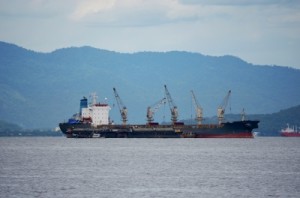
Senate Bill No. 2486, or “An Act Exempting Carriage of Container Vans from the Provision of Section 1009 of Presidential Decree No. 1464, otherwise known as the Tariff and Customs Code of 1978 and for Other Purposes,” authored by Senator Paolo Benigno “Bam” Aquino IV, was approved by his Committee on Trade, Commerce, and Entrepreneurship last year.
The bill had received approval from concerned government agencies and the private sector.
In his sponsorship speech on January 28, Aquino said the exclusive right of domestic carriers to inter-island shipping, known as cabotage, “incurs an extra cost for our importers of raw materials and for Philippine exporters of goods.”
Benefits
According to Aquino, SB 2486 will provide producers and entrepreneurs these benefits: lower production costs, ease doing business in the maritime transport industry, decongest the Manila Port, and further leverage on the country’s strategic location in the Association of Southeast Asian Nations (ASEAN) market.
The senator said currently, an exporter from Cagayan de Oro (CDO) that sends goods to Hong Kong has to pay twice: US$1,120 for shipping from CDO to Manila through a domestic carrier, then another $144 for the transport from Manila to Hong Kong on a foreign ship, for a total of $1,264 in expenses.
If his bill is passed, Aquino said the exporter will pay only $500, and the $764 saved can be used for business expansion and product improvement.
As for imports, an importer in CDO who usually pays $159 to ship from Kaohsiung, Taiwan to Manila and another $1,120 from Manila to CDO will only pay $360 for a direct service to CDO from Taiwan.
Citing a 2011 report from the Joint United States Government and Government of the Philippines Technical Team, Aquino said shipping cost in the Philippines is 250% higher than in Indonesia (per nautical mile).
Aquino said this is “not acceptable” because shipping costs are passed on to entrepreneurs and ultimately to consumers.
Furthermore, Aquino said SB 2486 aims “to streamline our processes, make our ports more efficient and easier for doing business.”
He noted that although co-loading of goods is already a market practice, this needs a special permit from the Maritime Industry Authority (MARINA).
But since special permits usually take 15 days or more to process, most foreign shipping lines would rather go to a transshipment point rather than get a clearance from MARINA.
Moreover, with SB 2486, the senator said exporters from Subic, Cebu, CDO, and Davao can co-load on one ship before heading out of the country directly, which will again be more efficient and cost-effective than passing by Manila.
“The bill encourages our micro, small and medium entrepreneurs to think globally since importing raw materials and exporting Filipino goods would be cheaper,” Aquino stated.
Decongesting Manila
The reform will also help decongest Manila ports as most shipments that normally have to go to Manila’s two container terminals first will be allowed to go directly to other domestic ports around the country, and “it will free up space in the container yards in the Greater Manila Area.”
“This will save time, costs and energy for our exporters and importers in sending their raw materials, and goods and products in and out of the country,” Aquino pointed out.
Allowing foreign ships to dock in more ports will likewise raise economic activity in other parts of the country, according to the lawmaker.
Lastly, Aquino said the proposed reform is “part of a larger effort to further capitalize (on) our strategic location in the ASEAN market.”
Aquino cited a report by South Korea’s Ministry of Land, Transport and Maritime Affairs entitled “Formulating an ASEAN Single Shipping Market Implementing Strategy,” which mentions how the Philippines’ low investment in ports and road infrastructures hampers intermodal transport.
The study also notes that the country’s strong cabotage policy “hinders our economic development” and stresses that permitting foreign ships to dock at various ports all over the country is needed “to achieve sustainable growth, and more importantly, to achieve a single ASEAN market.”
In line with ASEAN integration this year, the region is implementing a single shipping market where member-countries are expected to deliver quality service at a competitive price.
Aquino noted that once the bill is passed, it will necessitate sufficient and quality infrastructure and facilities in Philippine ports, good roads, and lower costs of transporting cargoes.
He said the country must construct ports that can compete with the modernized and computerized ports of Singapore, Thailand, and Indonesia.
“As we continue to develop from a low-income to a middle-income economy, we need to revisit our policy environment to be able to support this growth that we are experiencing as a country,” Aquino said.
He noted that the bill is “our first response to the call of the President and various stakeholders to enhance the Philippine maritime transport industry.” – Roumina Pablo
Image courtesy of furuoda at FreeDigitalPhotos.net









